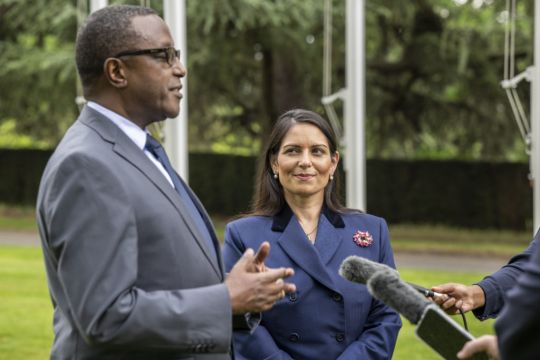UK and Rwandan ministers have hit back at two United Nations agencies which condemned the controversial plan to send some asylum seekers from the UK to the African country.
In an interview with the Associated Press before meeting officials from the UN human rights and refugee agencies, Rwandan foreign minister Vincent Biruta acknowledged it was “fine that they be concerned”, adding that the discussion was aimed “to bring them on board” to work with the two countries.
The UN refugee agency chief, in remarks on Twitter, sounded unconvinced.
Under the plan unveiled last month, British officials said they will send migrants arriving in the UK illegally – often as stowaways or in small boats crossing the English Channel – to Rwanda.

There the migrants’ asylum claims will be processed, and if successful, the migrants will stay there.
UN officials and other critics — particularly in the two countries — raised human rights concerns and warned such a move goes against the international Refugee Convention.
Home Secretary Priti Patel said Britain had seen over 20,000 people enter illegally over the last year, and insisted that her Conservative government — along with Rwanda — was “finding new innovative solutions to global problems” amid a crisis of illegal immigration.
She insisted the plan was about saving lives of people taken by smugglers on often-treacherous journeys to try to reach Britain.
“I’m afraid other organisations and other countries, you know, are not coming up with alternatives – and the status quo is simply not acceptable anymore,” she said.
The meetings come a day after Ms Patel’s office, hosting Mr Biruta in London, announced that a “first tranche of illegal migrants with no right to be in the UK have now been notified” of the British government’s intention to relocate them to Rwanda.
Ms Patel declined to specify how many people would be in that first group, how they arrived in Britain, or how many people overall might be sent to Rwanda under the plan, saying “we don’t share our operational details”
She decried “a lot of deliberate misinformation” about the people who would be sent to Rwanda.
The ministers met with the UN High Commissioner for Refugees Filippo Grandi, who last month regretted approval of the UK government’s proposal for a new approach to asylum that “undermines established international refugee protection law and practices”.
When the programme – the Migration and Economic Development Partnership – was announced in mid-April, Mr Grandi’s assistant high commissioner for refugees, Gillian Triggs, insisted that people fleeing war, conflict and persecution deserved empathy, adding: “They should not be traded like commodities and transferred abroad for processing.”
After Thursday’s meeting in Geneva, Mr Grandi tweeted that he had reiterated his concerns about the deal, adding: “Shifting asylum responsibilities is not the solution.”
Met @pritipatel and @Vbiruta. Reiterated UNHCR’s concerns about the UK-Rwanda deal. Shifting asylum responsibilities is not the solution. UNHCR will continue proposing concrete alternatives that respect international refugee law. See my previous statement: https://t.co/ZMHidSQuAS
— Filippo Grandi (@FilippoGrandi) May 19, 2022
He said his agency, UNHCR, “will continue proposing concrete solutions that respect international law”.
The ministers also met Nada al-Nashif, the UN deputy high commissioner for Human Rights.
Last month, the UN human rights office tweeted its support for UNHCR’s position, saying the plan raises human rights concerns — notably about forcible returns, family separation, “arbitrary deprivation of liberty” and the prospect that cases might not be assessed on an individual basis.
A statement from the British Home Office after the meetings in Geneva, which also involved visits with diplomats from Australia, Canada, New Zealand and the United States, said Rwanda was a “fundamentally safe and secure country”.
It added that the partnership plan would process asylum claims in accordance with the Refugee Convention, as well as national and international human rights laws.
Mr Biruta said initial planning considered that some 30,000 people might be involved in the plan, but in any case Rwanda could take in thousands.







